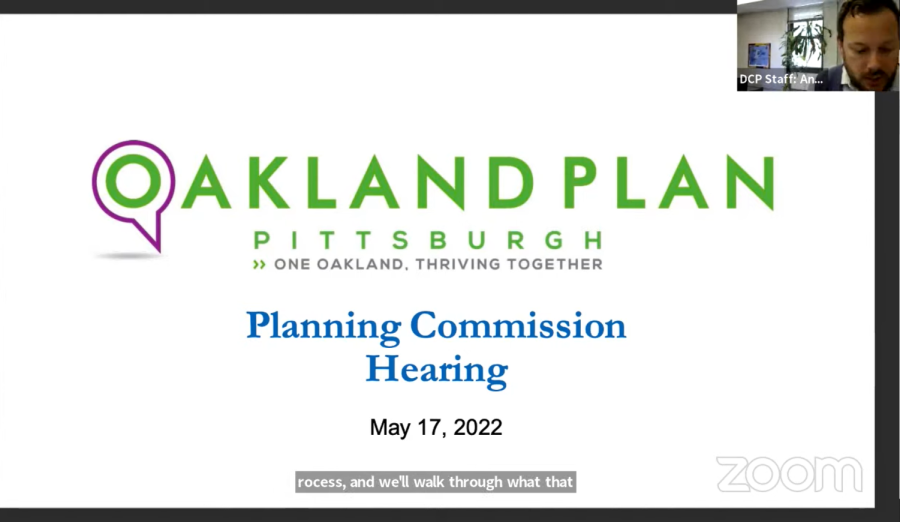City Planning Commission requests four-week continuance for Oakland Plan at public hearing
The planning commission’s public hearing on Tuesday.
May 18, 2022
At the recent City Planning Commission meeting, Department of City Planning deputy director Andrew Dash discussed some of the challenges that came with building a plan to satisfy everyone in the Oakland neighborhood, including the many diverse groups of people who live and work there.
“As we all know, Oakland is a very complex neighborhood with institutions, with the strong business community, with residents, with students that are not residents, with other visitors to Oakland,” Dash said. “Obviously understanding that there are just so many different constituents and constituencies… but those were ones that we wanted to look towards addressing.”
The partners of the Oakland Plan requested a four-week continuance to address comments from the public input process at a City Planning Commission meeting on Tuesday via Zoom. The Oakland Plan, a 10-year proposal for Oakland’s continued development, was initially proposed back in 2019, and now, the Department of City Planning has begun to “assemble, review and adopt the plan,” according to their website.
The plan opened to public comment on March 7 for 30 days, but it was extended to 55 days and ended on May 1. Two open houses were held during this time to allow Oakland residents to input their comments and concerns.
At the meeting, Dash relayed some of the results his team found from the public comments.
“On the plan itself, we had over 750 comments,” Dash said. “We had an additional just under 200 on these zoning amendments.”
Of those comments, Dash said 25% were “generally positive,” and consisted of residents showing their support. Many comments were asking clarifying questions, and about 40% were “seeking changes, or highlighting concerns” with the plan.
“Part of the reason that we’re asking for this continuance is that there’s about 40 comments out of those 750 on the plan that do warrant further conversations with the people who made them, whether those were organizations or individuals,” Dash said. “So we really want to be able to take those four weeks to address those additional 40 comments.”
Dash said while a large percentage of the comments focused on the strategies and implementation of the Oakland Plan, a few focused on the overall vision and goals.
“Only about 90 of them were about the vision, the goals and the policies, which ultimately are the pieces that the planning commission will adopt,” Dash said.
Stephanie Joy, a City Planning staff member who stepped up as the project’s manager, discussed a few of the themes that were found in the comments.
“We did identify themes of comments, especially to address multiple constituency concerns,” Joy said. “So prioritization and financing and funding are some of the questions that are outstanding, as well as affordable student housing.”
The meeting also included discussions about a construction project in downtown Pittsburgh to convert a warehouse at 642 Fort Duquesne Blvd. to apartments, as well as a new construction project to add several stories to a building at 305 Wood St. for residential use. Additionally, City Planning members proposed a new sewer overflow building at the meeting.
While no public testimony for the Oakland Plan was heard at Tuesday’s meeting, there will be an opportunity for community members to speak to the commission in four weeks, according to Planning Commission Chairwoman Christine Mondor.
“Staff will provide us an update on the public input process and request the planning commission continue the public hearing until June 14, 2022, with public testimony taken at that meeting,” Mondor said.








